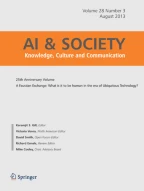Abstract
How does one begin to define the global identity? How does globalization offers a sense of identity, a sense of belonging, to an individual, in particular a non-westerner? Has globalization given a new identity to the erstwhile-colonized subject, who had been holding on tightly to the idea of nationalism that offered him an identity—passport into the world? My paper explores the contestation of identity—culturally—in the globalized world. It argues that cultural identity remains in a flux, whatever may the context be. From the period of colonialism to that when nation was regarded as the foremost structure of collective identity, which then defined the self, and finally in the era that we call as the modern or the postmodern period, or even globalization, identity is pushed toward liminality.
Similar content being viewed by others
Explore related subjects
Discover the latest articles, news and stories from top researchers in related subjects.References
Anderson B (1991) Imagined communities: reflections on the origin and spread of nationalism. Verso, London
Bakhtin MM (1981) The dialogic imagination: four essays. University of Texas Press, Austin
Bhabha H (1994) The location of culture. Routledge, London
Fanon F (1990) Wretched of the earth. Penguin, London
Hall S, du Gay P (eds) (2000) Question of cultural identity. SAGE, London
Lacan J (2001) Ecritus: a selection. Routledge, London
Miller D, Slater D (2000) The internet: an ethnographic approach. Berg, New York
Russel B (1961) History of western philosophy. Routledge, New York
Said E (1993) Culture and imperialism. Vintage, London
Taylor C (1992) Multiculturalism and the ‘Politics of Recognition’. Princeton University Press, Princeton
